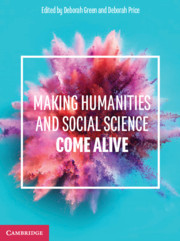Making Humanities and Social Sciences Come Alive Early Years and Primary Education
Langue : Anglais
Coordonnateurs : Green Deborah, Price Deborah

Prepares readers to become high-quality humanities and social sciences educators for early childhood and primary contexts.
Humanities and Social Science (HASS) education is integral in the development of active and informed citizens, and encourages learners to think critically, solve problems and adapt to change. Making Humanities and Social Sciences Come Alive: Early Years and Primary Education prepares pre-service educators to become high quality HASS educators who can unlock the potential of all students. Closely aligned with the Australian Curriculum and Early Years Learning Framework, this text is designed to enhance teaching practices in history, geography, economics and business, and civics and citizenship. The text provides readers with an in-depth understanding of the curriculum structure, the individual disciplines, pedagogical approaches to teaching HASS, inclusivity, global connections and the transition to practice. Examples are provided for early childhood and primary education, making this an inclusive, versatile and comprehensive text. This book is an invaluable resource that provides pre-service educators with the knowledge and skills to deliver this exciting curriculum.
Part I. Humanities and Social Sciences Curriculum: 1. Making humanities and social sciences come alive: the significance of curriculum in education Deborah Green and Deborah Price; 2. A guided tour of the HASS Australian Curriculum: planning and integrating learning Deborah Green and Deborah Price; 3. HASS in the early years: connecting the Early Years Learning Framework and the Australian Curriculum Helen Ovsienko; 4. Humanities and social sciences in the early childhood and primary years Mallihai Tambyah, Deborah Green and Deborah Price; Part II. HASS Concepts and Sub-strands: 5. Conceptual thinking in HASS Malcolm McInerney; 6. The past in the present: bringing history and citizenship education to life in early years settings Peter Brett and Katia Duff; 7. History and historical inquiry Deborah Henderson; 8. Making geography come alive by teaching geographical thinking Malcolm McInerney; 9. Civics and citizenship in the twenty-first century Andrew Peterson and Grace Emanuele; 10. Bringing economics and business into educational settings Anne Glamuzina; Part III. Teaching and Learning in HASS: 11. Inquiry learning – the process is essential to the product Kim Porter and Madeline Fussell; 12. Engaging with ethical understanding in the early years and beyond: the community of inquiry approach Martyn Mills-Bayne; 13. The power of play to engage and nurture creative, independent learners Jane Webb-Williams; 14. Using picture books to develop language and literacies in HASS Jann Carroll; 15. Effective assessment practices Sue Jones and Carmel Dineen; Part IV. Integration across Cross-Curriculum Priorities: 16. The General Capabilities' synergy with HASS Malcolm McInerney, Deborah Green and Deborah Price; 17. Authentic engagement with Aboriginal and Torres Strait Islander content in P–6 education Kevin Lowe and Janet Cairncross; 18. Studies of Asia and Australia's involvement with Asia Deborah Henderson; 19. Educating for sustainability: theoretical and practical insights for preservice teachers Kathryn Paige, David Lloyd and Samuel Osborne; Part V. HASS for All Learners: 20. Values education and social justice Tace Vigilante; 21. Culturally responsive pedagogy: respecting the diversity of learners studying humanities and social sciences Dylan Chown; 22. Humanities and social sciences for everyone: inclusive approaches respectful of learner diversity Deborah Green and Deborah Price; Part VI. Community and Global Connections: 23. Using community resources to develop active and informed citizens Jann Carroll; 24. Uncovering hidden gems in the community Mandi Dimitriadis; 25. Enhancing HASS learning with technology Mandi Dimitriadis; 26. Libraries and librarians: at home with HASS Katie Silva; 27. Global education Andrew Peterson and Zea Perrotta; Part VII. Getting Started: 28. Early career teaching in the early years Steven Cameron; 29. Early career teaching in the primary years Deana Cuconits.
Deborah Green is Lecturer Humanities and Social Sciences and Inclusive Education for the School of Education, University of South Australia. She is an active member of the University of South Australia Centre for Research in Education and Social Inclusion (CRESI), Inclusive Communities for Justice and Wellbeing Research group, executive Secretary of HASS SA committee, committee member of Social and Citizenship Association of Australia (SCEAA) and co-editor of The Social Educator.
Deborah Price is Program Director Master of Teaching and Lecturer Inclusive Education and Wellbeing for the School of Education, University of South Australia. She is President of the Australian Curriculum Studies Association, member of the University of South Australia Centre for Research in Education and Social Inclusion (CRESI) Inclusive Communities for Justice and Wellbeing Research group.
Deborah Price is Program Director Master of Teaching and Lecturer Inclusive Education and Wellbeing for the School of Education, University of South Australia. She is President of the Australian Curriculum Studies Association, member of the University of South Australia Centre for Research in Education and Social Inclusion (CRESI) Inclusive Communities for Justice and Wellbeing Research group.
Date de parution : 02-2019
Ouvrage de 552 p.
19x25.4 cm
Disponible chez l'éditeur (délai d'approvisionnement : 14 jours).
Prix indicatif 75,14 €
Ajouter au panierThème de Making Humanities and Social Sciences Come Alive :
© 2024 LAVOISIER S.A.S.



